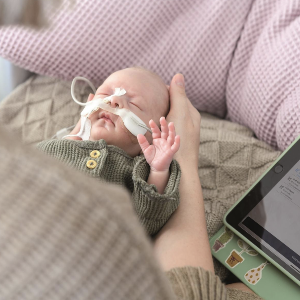A safe start for premature babies
11 Nov 2024
WORLD premature babies DAY ON 17 NOVEMBER - The "Welcome" project supports families after hospital discharge through telemedicine
11 Nov 2024
WORLD premature babies DAY ON 17 NOVEMBER - The "Welcome" project supports families after hospital discharge through telemedicine

The Welcome project supports families of premature babies via an app and with digital expert consultations. | © LMU Klinikum
When parents of premature babies return home from hospital, they often face major challenges - especially if the child requires intensive aftercare. The "Welcome" project now offers these families digital support in addition to existing services: a customized app, regular video consultations and a learning platform are designed to make the transition easier. The four-year project by LMU Klinikum München, Charité - Universitätsmedizin Berlin, Techniker Krankenkasse, the Institute for Medical Information Processing, Biometry and Epidemiology at LMU and technology partner MedKitDoc - BDS Digital Health Solutions GmbH was launched in October 2024. The innovation fund of the Federal Joint Committee (G-BA) is supporting the interdisciplinary research project involving nursing, medicine and socio-medical aftercare with over 5.8 million euros.
"With this project, we are supplementing the existing aftercare structures with our telecare and telemedical services," says Prof. Dr. Uli Fischer, Head of Clinical Nursing Research and Quality Management at LMU Klinikum, who is in charge of the project together with Prof. Dr. Andreas W. Flemmer, Head of Neonatology at the hospital. "Our aim is to create an 'extended arm' of the university hospitals into the home environment." Potential patients include premature babies who were cared for in hospital up to their due date and have organic problems, for example with their heart, lungs or intestines. Babies born at term with congenital defects of the oesophagus, diaphragm or abdominal wall who were operated on immediately after birth can also be cared for.
"The focus is particularly on families who have not previously been able to benefit from existing services, for example due to language or care barriers," says PD Dr. Antje Tannen, research associate at Charité's Institute of Clinical Nursing Science. "In rural areas in particular, there is a lack of specialized paediatric nursing services, meaning that many parents are left to fend for themselves after discharge from hospital." At the same time, there are more and more premature babies who need more intensive care even after discharge.
Digitized expert consultation for seamless aftercare
In the Welcome project, specialized paediatric nurses and neonatologists support families for three months after discharge from hospital with regular video consultations. Parents can contact the specialists via chat or telephone if they have any acute questions. "We are offering a digitalized expert consultation, so to speak," explains Prof. Flemmer. "We are laying the foundations for a comprehensive telemedicine platform so that we can provide even better care for premature babies after discharge." Families will receive a tablet and medical aids such as a stethoscope, measuring tape, digital scales and pulse oximeter. During the video consultations, they can transmit their weight, height and other health parameters to the experts. Using video or photos, the clinicians can see, for example, how the children are moving or whether feeding tubes are being fitted correctly.
App for video consultations and learning platform
For the televisits with the hospital doctors, technology partner MedKitDoc has further developed an app that was originally used for video consultations with GPs. The service also includes digital appointment booking, a chat and a virtual learning platform, where parents can find multimedia information material and decision-making aids, such as video instructions on breastfeeding or how to care for a feeding tube. The service can also be offered in several languages thanks to an integrated interpreting service.
A sustainable solution for aftercare
The project is currently in the preparatory phase; in the second half of 2025, the first children and their parents will be included in the study at LMU Klinikum München and Charité in Berlin; a total of 160 families are expected to take part. The Welcome project aims to train parents in their health literacy so that they can take over individual care steps and spend more time at home with their premature babies - stress-free and without unnecessary hospital visits. In the long term, the project partners want to ensure that fewer premature babies have to attend emergency outpatient clinics or are admitted back to hospital.
Model for further telemedical aftercare services
The project will run for four years and will be subject to an accompanying scientific evaluation. The evaluation results form the basis for the further development and expansion of additional telemedical aftercare services, not least in view of the increasing outpatient care resulting from the new Hospital Reform Act: "The digital transition from hospital to post-hospital care can also be adapted for other target groups, for example for children and adults in need of care with rare diseases, cancer or metabolic diseases, but also for senior citizens or people with disabilities," says Prof. Fischer.
About the Welcome project:
The Welcome project is an interdisciplinary research project involving nursing, medicine and socio-medical aftercare. The Innovation Fund of the Joint Federal Committee is funding the four-year project in the field of technology development in the nursing and medical care of premature/mature babies with a total of over 5.8 million euros. The consortium is led by LMU Klinikum; the project partners include the neonatology departments of LMU Klinikum and Charité - Universitätsmedizin Berlin, Techniker Krankenkasse, the Institute for Medical Information Processing, Biometry and Epidemiology at LMU and the technology partner MedKitDoc - BDS Digital Health Solutions GmbH. Several aftercare institutions and parents' associations advise the project partners on the Critical Advisory Board, including the Federal Association “Das Frühgeborene Kind” e.V.